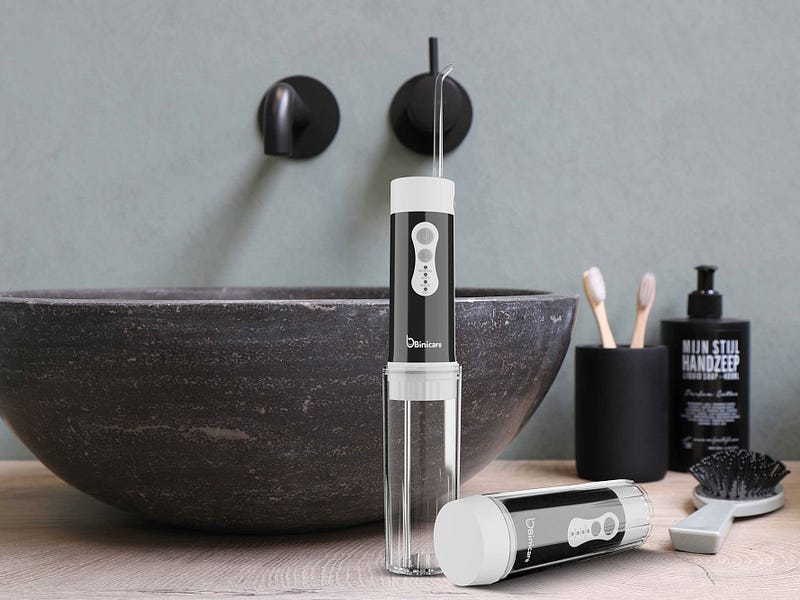Water Flosser Benefits- Dental Cleaning with Powerful Pulses

Water flossers are oral hygiene devices that make use of steady water with steady pulses to help you remove plaque, food, bad bacteria, and other particles from between your teeth and below the gum line. Since flossing is an important part of our oral hygiene routine, it is very important that you floss your teeth at least once a day. As for best water flossers, people always focus on high quality or user-friendly design but not just a higher price, a suitable teeth cleaner seems even more necessary.

Is Water Flossing Necessary to Plaque Removal?
Flossing is important because a toothbrush, no matter the manual or electric one, is only able to reach the surfaces of your teeth, and the built-up plaque, food particles, and harmful bacteria are usually stuck between the teeth which are only accessible by the best water flosser for teeth.
In fact, dentists say that people who do not floss their teeth miss more than one-third of each tooth’s surface area. This is a staggering number because if plaque isn’t removed in 24 hours, it can become harder and convert to tartar which can only be removed by a professional dentist. Plaque is a significant cause of gum diseases including gingivitis. By making sure you brush at least twice a day and floss at least once a day to remove plaque from teeth, you can prevent plaque from becoming tartar. Plaque and tartar can lead to dental problems such as cavities, gingivitis, periodontal (gum) disease, tooth decay, and loss.
How to Reduce Bleeding Gums with Water Flossers?
Bleeding gums could be a sign of gingivitis. When you eat something or just brush your teeth, your gums would bleed so suddenly. So why do you suffer from it? Aside from plaque, the other thing that triggers gum bleeding is how harshly you brush or floss your teeth which affects the soft tissues in your gum line. Damaged gum may also result in inflammation, making your gum very red and swollen. Despite this, we still need to clean up our teeth and gums to keep good oral hygiene.
Therefore, if you have sensitive gums, use a water flosser to floss your teeth instead of the conventional floss. The pressure of the streaming water is not that high to create damage to your teeth and gums, unlike string floss, and you could start with the lowest pressure mode for the first time, which will not be harsh enough for your gums. As you get used to using the water teeth cleaner, you can set the control dial to high or as to your favored volume in flossing your teeth and gums. There are no other dental cleaning tools that can help you clean your teeth without hurting your gums.
You could choose a water flosser for sensitive gums and prove that a recent dental study revealed that the use of the water flosser solution is more effective and convenient to reduce gum bleeding than an interdental brush.
Make it a habit to include daily flossing in your oral hygiene routine with the use of water flossing. Even when you are traveling, you could also choose a suitable travel size water flosser with you. If you’re still not convinced of the benefits of a water flosser talked about above, there is no way you can keep your mouth clean and healthy.
Is the Water Flosser Really Better than String floss?
There is much research that has compared water flossing and string dental flossing, with mixed results. An oral care water flosser doesn’t replace your toothbrush or traditional flossing. You still need to brush your teeth at least twice a day, but you can use the water flosser before or after as a powerful supplement to protect your dental health.
How String Floss Works
The process of dental floss uses a string to push in between your tooth gaps. The string gently scrapes up and down each surface of the tooth to help you to remove plaque from teeth and under the gumline.
Advantages of Traditional Floss
- Efficient to remove left behind food and debris from between your teeth.
- Lower price to get and easily accessible from any pharmacy or grocery store.
- Space-saving and portable to carry with.
Disadvantages of Traditional Floss
- Difficult to reach specific areas of the mouth.
- Easy to cause minor bleeding and gum infection.
- Unfriendly to use for the first time.
When using conventional floss, be sure to monitor any worsening gum sensitivity and discuss any persistent discomfort with your dentist. However, will the water flosser prevent these problems? Is it really necessary? Are water picks better than floss? You could make a choice after reading the questions as follows.
How Water Flossers Work
A water flosser, also known as the oral irrigator, works by shooting out a pressurized stream of steady water. Just simply hold the device over the surface you’d like to clean, and the water does the work for you. You could change the pressure modes and nozzle tips as you like to adapt to your personal habits and sensitive teeth and gums. Certainly, don’t forget to clean the water tank regularly to limit bad bacteria and bad smells.
Benefits of Water Flosser
Water flossing, or water picking, utilizes a special machine that directs a stream of water into the mouth and gums. Rather than scraping the teeth to remove plaque, water flossing uses the pressure of the water to massage the gums and push the food away from the teeth.
A Binicare portable water flosser is easy to use, especially for people with braces, or other types of dental work like permanent or temporary bridges. The massage action can also improve gum health and reach areas that can’t be reached with traditional floss.
Disadvantages of Water Flossers
Perhaps the main disadvantage of a water flosser is the cost. Generally speaking, the best water flosser can be expensive to purchase and will need space to be stored, certainly, you could also choose a portable water flosser or a travel-size water flosser. And the water flosser requires access to electricity and water, making it difficult to use outside of the home or while traveling if you do not choose a cordless one.
Which Is Better, Water or Dental Floss?
Many studies have compared water flossing and conventional string floss. Overall, the American Dental Hygienists’ Association recommends water flossing over string dental flossing.
Suitable and best portable water flossers are effective at removing plaque and reducing gingival bleeding more than string floss. A water flosser is also convenient and effective for those with limitations including arthritis or braces, where maneuvering string floss can be difficult.
Final Thought
Whether you decide that a water flosser or string floss is right for you, the most important thing is that you floss daily regardless of the method you choose. The string floss could be a supplement to the water flosser to safeguard your dental hygiene, and the water flosser is more convenient and effective.
Cited from https://binicare.com/blogs/binicare-blog.

Comments
Post a Comment